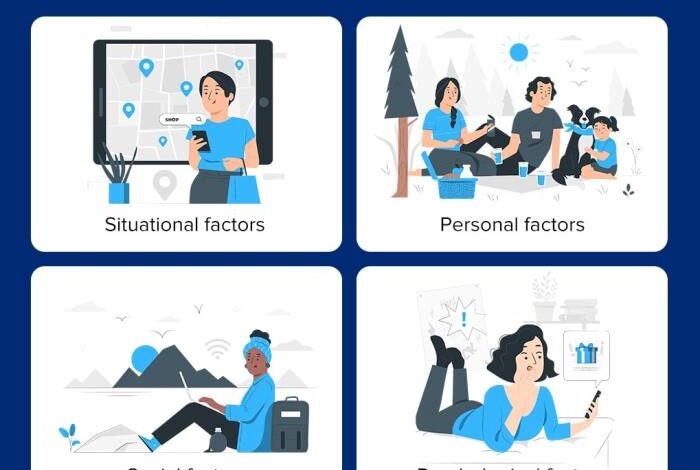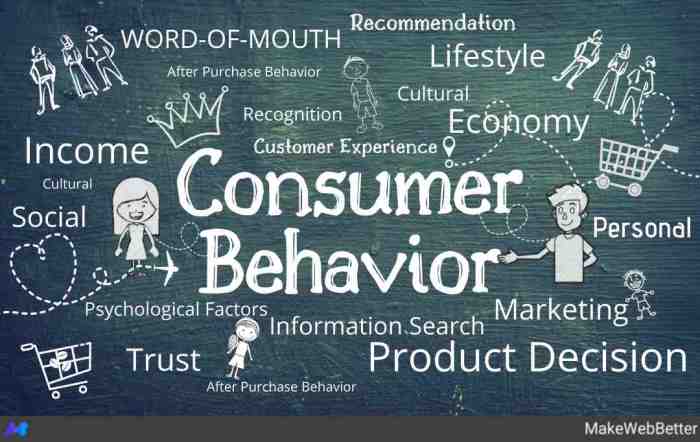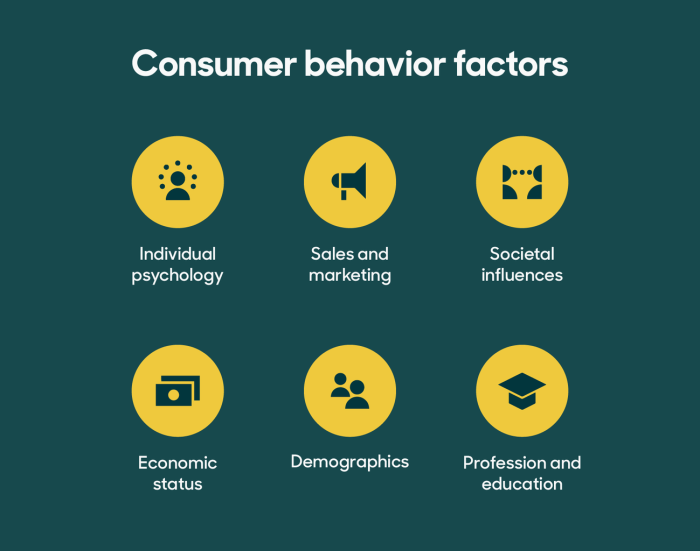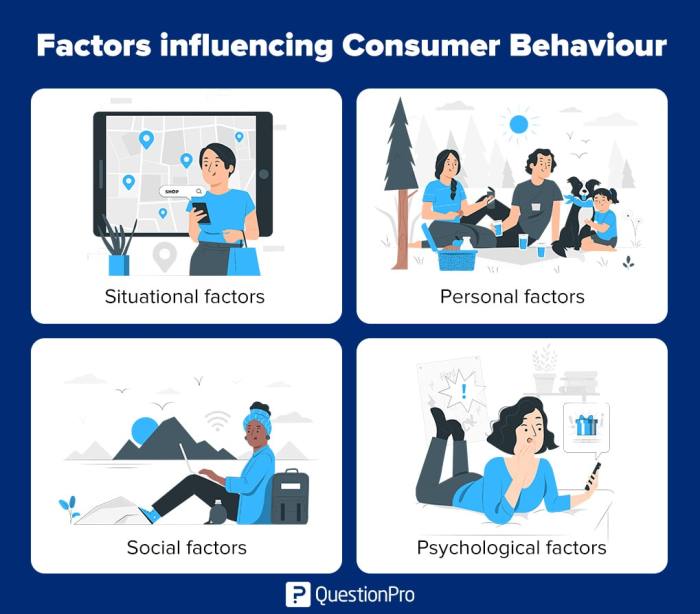
Kicking off with Understanding the psychology of consumer behavior online, this comprehensive exploration delves into the various factors, impacts, and strategies that shape consumer behavior in the digital realm, providing valuable insights for marketers and businesses alike.
Understanding Consumer Behavior Online

Consumer behavior online refers to the study of how individuals behave and make decisions while interacting with digital platforms, websites, and online advertisements. Understanding consumer behavior online is crucial for marketers as it helps them tailor their strategies to effectively reach and engage their target audience in the digital landscape.
Factors Influencing Consumer Behavior Online
The following factors influence consumer behavior in online settings:
- The convenience and accessibility of online shopping platforms
- The influence of online reviews and ratings on purchase decisions
- The impact of social media and digital marketing campaigns
- The personalization and customization options available online
Comparison of Online and Offline Consumer Behavior
Consumer behavior online differs from offline behavior in various ways:
- In online settings, consumers have access to a wide range of product information and reviews, leading to more informed purchase decisions.
- Online shopping offers the convenience of 24/7 availability and the ability to shop from anywhere, unlike traditional brick-and-mortar stores.
- Online shopping experiences can be personalized based on consumer preferences and browsing history, creating a more tailored shopping journey.
Decision-making Process in Online vs. Traditional Shopping Environments
The decision-making process of consumers in online and traditional shopping environments can be compared and contrasted as follows:
- In online shopping, consumers tend to conduct extensive research before making a purchase, while offline shoppers may rely more on in-store interactions and recommendations.
- Online shoppers may experience decision fatigue due to the abundance of options available, while traditional shoppers may be limited by the selection in physical stores.
- Online shopping allows for quick price comparisons and easy access to discounts, influencing purchase decisions differently than in traditional settings.
Psychological Factors Influencing Online Consumer Behavior
Perception plays a crucial role in shaping consumer decisions online. The way individuals interpret and make sense of information presented to them on websites or online platforms can greatly influence their purchasing behavior. Factors such as website design, product presentation, and customer reviews can all impact how consumers perceive a brand or product.
Role of Perception in Online Consumer Behavior
- Consumers tend to form opinions about a product or brand based on how it is presented online.
- Visual elements, such as color schemes, images, and layout, can affect how consumers perceive the quality and reliability of a product.
- Positive online reviews and ratings can enhance consumer perception and increase trust in a brand.
- Perceived value, influenced by factors like pricing, discounts, and product descriptions, can impact purchasing decisions.
Impact of Motivation on Online Shopping Behavior
- Consumers are motivated to shop online for various reasons, including convenience, time-saving, and access to a wide range of products.
- Personal needs and desires drive consumer motivation, influencing the products they choose to purchase online.
- Promotional offers, discounts, and rewards can serve as motivational factors for online shoppers.
- The desire for status, social recognition, or self-improvement can also motivate online consumer behavior.
Influence of Personality Traits on Online Consumer Choices
- Individual differences in personality traits, such as openness, extraversion, conscientiousness, agreeableness, and neuroticism, can impact online shopping behavior.
- Consumers with high levels of extraversion may be more likely to engage in social shopping or seek recommendations from others online.
- People with a high level of conscientiousness may prefer to research products thoroughly before making a purchase decision.
- Personality traits can also influence brand loyalty, impulse buying tendencies, and willingness to take risks in online shopping.
Impact of Social and Cultural Factors on Online Consumer Behavior
- Social factors, such as social influence, reference groups, and social media, can affect consumer behavior online.
- Cultural norms, values, and beliefs play a significant role in shaping consumer preferences and decision-making in the digital space.
- Online communities, forums, and influencers can sway consumer opinions and choices based on social interactions and cultural influences.
- Globalization and cross-cultural interactions online have further blurred cultural boundaries, impacting consumer behavior in a diverse and interconnected digital environment.
Online Shopping Experience: Understanding The Psychology Of Consumer Behavior Online

User experience (UX) plays a crucial role in influencing consumer behavior online. A seamless and intuitive online shopping experience can significantly impact a consumer’s decision-making process and ultimately lead to increased conversions and customer satisfaction.
Importance of Website Design and Layout
Website design and layout are essential factors in enhancing the online shopping experience. A visually appealing and user-friendly website can create a positive first impression, build trust with consumers, and encourage them to explore products further. Clear navigation, intuitive search functionality, and optimized checkout processes all contribute to a smooth and enjoyable online shopping experience.
Impact of Product Descriptions and Visuals, Understanding the psychology of consumer behavior online
Product descriptions and visuals play a vital role in influencing consumer decision-making online. Detailed and accurate product descriptions help consumers understand the features and benefits of a product, leading to informed purchasing decisions. High-quality images, videos, and interactive content create a sensory experience for consumers, allowing them to visualize the product and make a more confident purchase.
Influence of Customer Reviews and Ratings
Customer reviews and ratings have a significant influence on online purchasing behavior. Positive reviews and high ratings can build credibility and trust in the product and brand, reassuring consumers that they are making a good choice. On the other hand, negative reviews can deter potential buyers and lead to lost sales. Consumers often rely on peer feedback to validate their purchase decisions, making customer reviews a powerful tool in shaping online consumer behavior.
Marketing Strategies to Influence Online Consumer Behavior
Personalized recommendations and targeted advertising play a crucial role in influencing online consumer behavior. By leveraging data about a user’s preferences, browsing history, and purchase patterns, companies can tailor product recommendations and advertisements to meet individual needs and interests. This personalized approach enhances the overall shopping experience and increases the likelihood of conversion.
Role of Social Media Marketing
Social media marketing has a significant impact on shaping consumer perceptions and behaviors online. Platforms like Facebook, Instagram, and Twitter allow brands to connect with their target audience, build relationships, and create engaging content that drives consumer engagement. By leveraging social media influencers, user-generated content, and targeted ad campaigns, companies can effectively influence consumer behavior and drive sales.
Effectiveness of Email Marketing Campaigns
Email marketing campaigns remain a powerful tool for engaging online consumers. By delivering personalized content, exclusive offers, and targeted promotions directly to the consumer’s inbox, companies can nurture relationships, drive traffic to their website, and increase sales. Utilizing segmentation, A/B testing, and analytics, businesses can optimize their email campaigns for maximum effectiveness.
Impact of Scarcity, Urgency, and Social Proof Tactics
Scarcity, urgency, and social proof tactics are powerful psychological triggers that can impact online purchasing decisions. By creating a sense of scarcity through limited-time offers, limited stock, or exclusive deals, companies can drive urgency and motivate consumers to make a purchase. Additionally, leveraging social proof, such as customer reviews, testimonials, and user-generated content, helps build trust and credibility, influencing consumer behavior positively.
Conclusion

In conclusion, Understanding the psychology of consumer behavior online sheds light on the intricate interplay of psychological factors, online shopping experiences, and marketing strategies that influence consumer decisions in the digital landscape, offering a nuanced perspective for understanding and engaging with online consumers effectively.
Server downtime can be a major headache for businesses, leading to lost revenue and damaged reputation. To prevent server downtime, it is crucial to implement proper maintenance routines and monitoring systems. Regular backups and redundancy measures are also essential in ensuring continuous server operations.
For more detailed strategies on how to prevent server downtime, you can refer to this informative guide on How to prevent server downtime.
Ensuring the security and reliability of your server data is vital for business continuity. Investing in top server backup solutions can provide peace of mind and protection against data loss. These solutions offer automated backups, cloud storage options, and disaster recovery plans.
To explore the best server backup solutions available, check out this comprehensive list of Top server backup solutions.
Search Engine Optimization (SEO) and Search Engine Marketing (SEM) are two essential strategies for boosting online visibility. While both aim to increase website traffic, they differ in terms of techniques and goals. SEO focuses on organic search results and website optimization, while SEM involves paid advertising campaigns.
To understand the variances between SEO and SEM, you can delve into this insightful article on Differences between SEO and SEM.









